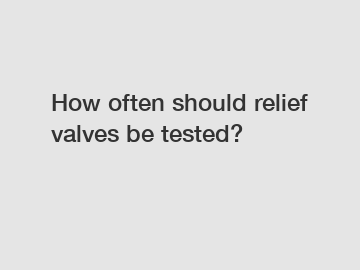How often should relief valves be tested?
Relief valves are critical components in any system where pressure is a concern. These valves are designed to release excess pressure and prevent catastrophic failures that could result in injury or damage to equipment. However, like any mechanical device, relief valves require regular maintenance and testing to ensure they are functioning properly.
One of the most common questions that facility managers and engineers ask is, "How often should relief valves be tested?" The answer to this question is not always straightforward, as it can depend on a variety of factors including the specific application, local regulations, and the manufacturer's recommendations. However, there are some general guidelines that can help determine the frequency of testing for relief valves.
In general, relief valves should be tested at least once a year. This annual testing ensures that the valves are functioning as intended and can provide peace of mind that the system is safe and compliant with regulations. However, in some industries or applications, more frequent testing may be necessary. For example, in high-pressure or high-temperature applications, relief valves may need to be tested more frequently to ensure they are up to the task of handling the conditions they are subjected to.

In addition to annual testing, relief valves should also be tested whenever there are significant changes to the system or equipment they are protecting. This could include changes in operating conditions, modifications to the system, or after any maintenance or repairs that could impact the performance of the relief valve. By testing relief valves after these changes, facility managers can ensure that the valves are still capable of protecting the system in the event of an overpressure event.
It is also important to note that relief valves should be tested by qualified personnel who have the necessary training and expertise to perform the testing safely and accurately. Improper testing or maintenance of relief valves can lead to serious consequences, so it is essential to entrust this task to experienced professionals.
When it comes to testing relief valves, there are a few different methods that can be used depending on the type of valve and the specific application. One common method is to perform a set pressure test, where the relief valve is tested at its specified set pressure to ensure that it opens and closes as intended. This test can help identify any issues with the valve that may prevent it from operating correctly in an overpressure event.
Another method of testing relief valves is to perform a flow test, where the valve is tested to ensure that it is able to handle the maximum flow rate that could be expected during an overpressure event. This type of test can help determine if the relief valve is capable of handling the required flow rate and provide valuable information on its performance under real-world conditions.
In addition to these standard testing methods, some relief valves may benefit from more advanced testing techniques such as ultrasonic or acoustic testing. These methods can provide additional insights into the condition of the relief valve and help identify any potential issues that may not be evident during a standard pressure or flow test.
Overall, the frequency of testing relief valves will depend on a variety of factors including the specific application, local regulations, and the manufacturer's recommendations. However, in general, relief valves should be tested at least once a year to ensure they are functioning properly and can provide the necessary protection in the event of an overpressure event. By following these guidelines and working with qualified professionals, facility managers can help ensure the safety and reliability of their systems.
Are you interested in learning more about Flange Management Process, China Pipe Flushing Service, Retro Jetting China? Contact us today to secure an expert consultation!


